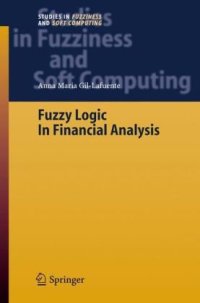
Ebook: Fuzzy Logic in Financial Analysis
- Genre: Economy
- Tags: Appl.Mathematics/Computational Methods of Engineering, Operations Research/Decision Theory, Business Information Systems, Business/Management Science general, Game Theory Economics Social and Behav. Sciences, Artificial Intelligence (
- Series: Studies in Fuzziness and Soft Computing 175
- Year: 2005
- Publisher: Springer-Verlag Berlin Heidelberg
- Edition: 1
- Language: English
- pdf
In today’s increasing complex and uncertain business environment, financial analysis is yet more critical to business managers who tackle the problems of an economic or business nature. Knowledge based on formal logic and even experience becomes less sufficient. This volume systematically sets out the basic elements on which to base financial analysis for business in the new century. It incorporates a previous work that can serve as the basis and foundation to the new contributions that are now being made in the field of financial economy and intend to provide business with instruments and models that are suitable for the treatment of the new economic context. In dealing with rapid and unpredictable changes in technological and business conditions, it postulates a growing reliance on the opinions of experts instead of past data or probabilistic forecasts, which is a radical change but may yield fruitful results. For this reason, much emphasis is devoted to the problem of aggregation of the opinion of experts in the financial field, with the object of limiting, wherever possible, the subjective component of the opinions and making sure that the decisions have the best guarantee of reaching the desired objectives.
In today’s increasingly complex and uncertain business environment, financial analysis is yet more critical to business managers who tackle problems of an economic or business nature. Knowledge based on formal logic and even experience becomes less sufficient. This volume systematically sets out the basic elements on which to base financial analysis for business in the new century. It incorporates a previous work that can serve as the basis and foundation for the new contributions that are now being made in the field of financial economy and intend to provide business with instruments and models suitable for dealing with the new economic context. In dealing with rapid and unpredictable changes in technological and business conditions, it postulates a growing reliance on the opinions of experts instead of past data or probabilistic forecasts, which is a radical change but may yield fruitful results. For this reason, much emphasis is devoted to the problem of aggregation of the opinion of experts in the financial field, with the object of limiting, wherever possible, the subjective component of the opinions and making sure that the decisions have the best guarantee of reaching the desired objectives.